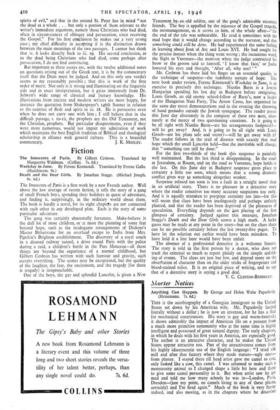Fiction
The Innocents of Paris is a first work by a new French author. Well above the low average of recent fiction, it tells the story of a gang of small French boys, spending their holidays in quest of adventure, and finding it, surprisingly, in the ordinary world about them. The book is hardly a novel, for its eight chapters are not connected with each other in any developed plan. Each is the story of some particular adventure.
The gang was certainly abnormally fortunate. Make-believe is the dull lot of most children, or at most the planning of some feat beyond hope, such as the inadequate arrangements of Dickens's Master Bitherstone for an overland escape to India from Mrs. Pipchin's Brighton establishment. The discovery of a royal coach in a disused railway tunnel, a drive round Paris with the police during a raid, a children's battle in the Parc Monceau—all these things are beyond the experience of a normal childhood, but Gilbert Cesbron has written with such humour and gravity, such accepts everything. The scenes may be exceptional, but the quality of the laughter, the fear, the excitement, and the tragedy (for there is tragedy) is irreproachable. One of the boys, the gay and splendid Lancelot, is given a New
Testament by. an-old soldier, one of the gang's admirable eccentric friends. The boy is appalled by the injustice of the Gospel tragedy, the mismanagement, -as it seems to him, of the whole affair—" for the end of the tale was unbearable. He read it sometimes with the mad hope that it would change according to the narrator; and that something could still be done. He had-experienced the same feeling in learning about 'oan of Arc and Louis XVI. He had sought for the precise instant When the thing went wrong ; the incautious word, the flight to Varennes—the moment when the judge contracted his brow or the groom said to himself, ' I know that face,' or Judas lowered his eyes and thought, ` After all, why not? ' " Mr. Cesbron has there laid his finger on an essential quality in the technique of suspense—the indefinite torture of hope. The next book under review, Ferenc Kormendi's Weekday in lune, is an exercise in precisely this technique. Nicolas Barat is a Jewish Hungarian spending. his last day in Budapest before emigrating. Louis Groeb, an old enemy school-fellow of Barat's, now a leader of the Hungarian Nazi Party, The Arrow Cross, has organised for the same day street demonstrations and in the evening the throwing of hand grenades outside the Jewish synagogue. The reader passes this June day alternately in the company of these two men, alter- nately at the mercy of two questioning emotions. Is it going to be all right with Nicolas Barat—are his arrangements foolproof?— will he get away? And, is it going to be all right with Louis Groeb—are his plans safe and secret?—will he get away with it? The reader follows in the trail of disaster with exactly that mad hope which the small Lancelot held—that the inevitable will change; that " something can still be done."
For the first two-thirds of the book this suspense is painfully well maintained. But the last third is dgappointing. In the court at Jerusalem, at Rouen, and on the road to Varennes, hope holds to the last. On this June day in Budapest suspense gives place to certainty a little too soon, which means that a strong dramatic conflict gives way to something altogether weaker.
Suspense relaxed too soon is less a fault in a straight novel than . in an artificial story. There is no pleasure in a detective story where the reader conceives too many accurate suspicions too early. And it is equally mistaken to postpone certainty too late—for this will mean that clues have been inadequately and perhaps unfairly planted, and that the reader has been deprived of the pleasures of speculation. Everything depends on the inst placing of the first glimpses of certainty. Judged against this measure, Jonathan Stagge's Death and the Dear Girls scores a high mark. A lucky guess may be made at any point in the story—but on the clues there can be no possible certainty before the last twenty-five pages. To have let the solution out earlier would have been mistaken. To have held it a line later would have been unfair.
The absence of a professional detective is a welcome feature. The story is told in the .first person by a doctor, who does not track the criminal so much as report plainly on the simple unfold- ing of events. The dues are just but few, and depend more on the obsert,ation of character than on the older tricks of fingerprints and blood-stained relics. It is an original piece of writing, and to say that of a detective story is saying a good deal.
V. C. CLINTON-BADDELEY.






























 Previous page
Previous page